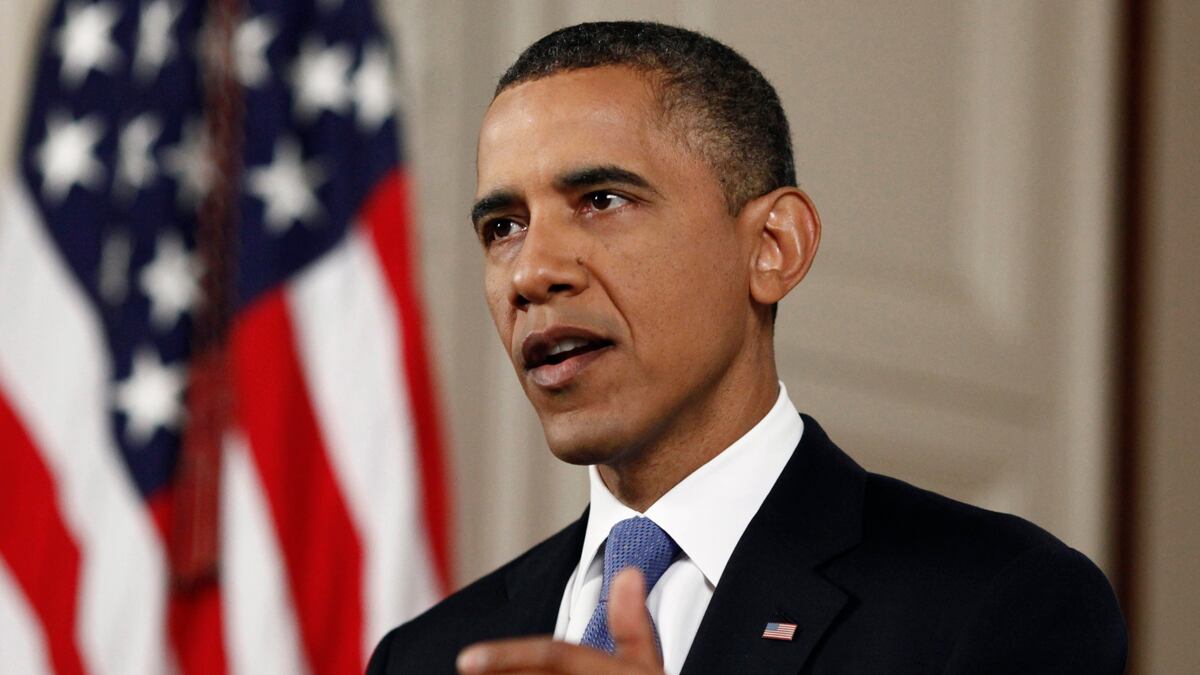Wouldn’t it be great if campaigns offered honest slogans, ones that told you the real reason to vote for their gal or guy? For the Romney campaign, a truly honest slogan would be something like: “Don’t worry, he doesn’t believe a lot of the stupid stuff he says.” For the Obama campaign it would be: “He’s managed America’s decline well.”
The Obama folks will never publicly admit that American power is in decline, but if you compare America’s international position today to its position in the late 1990s, the trajectory is obvious. In Bill Clinton’s second term, the U.S. was flush with cash, its military was coming off victories in the Gulf War, Bosnia, and Kosovo, governments across the world were embracing American-style deregulated capitalism, and America dwarfed its geopolitical rivals. Today, by contrast, America is deep in debt, its military is battered and exhausted, its economic ideology enjoys far less prestige, and it faces, in China, a genuine second superpower. Managing this reality has been the central foreign policy challenge of Barack Obama’s first term, and although his campaign can’t say so, he’s done a pretty good job.
A good example is Egypt. Since the 1970s, it has been a pillar of American dominance in the Middle East. Egyptian dictators made peace with Israel, cooperated with American-led efforts to force the Palestinians to do the same, and helped America battle various leftist and Islamist foes. Anwar Sadat and Hosni Mubarak weren’t perfect clients, to be sure. They indulged, and even fostered, anti-American and anti-Israeli sentiment at home, and their repression and corruption sometimes proved embarrassing. But for more than three decades, Egypt was led by men far more supportive of U.S. policy than were the people they ruled.
That’s less true today. Obama has taken heat for our declining influence in Cairo, with some conservatives saying he is partly to blame for “losing Egypt.” But Obama didn’t “lose Egypt,” because America never really had it. Ordinary Egyptians never embraced the alliance with the United States, because that alliance brought them neither freedom nor prosperity. What Obama “lost” was a regime willing to do America’s bidding despite its people’s desires, and had he tried to preserve that in the face of revolutionary change, things in Egypt would be even worse than they are today.

Since the Arab Spring came to Cairo 18 months ago, Obama has faced two key moments of decision. And at both points, his willingness to accept Egypt’s emerging, post-American order has served Egypt, and America, well. The first moment came when Egypt’s masses flooded into the streets early last year demanding that Mubarak resign. From the Gulf to Israel to the GOP, conservatives chastised Obama for not standing more firmly behind America’s old ally. But had Obama invited Mubarak to turn Tahrir Square into Tiananmen Square, Egypt might look more like Syria today. The opposition would likely have turned violent, Egypt’s chances for an even semi-democratic transition would have collapsed, and by aiding a mass slaughter, Obama would have virtually guaranteed the hatred of whatever revolutionary force ultimately succeeded the 84-year-old dictator.
The second key moment came last week when the Supreme Council of the Armed Forces, the junta that replaced Mubarak, apparently considered declaring its lackey, Ahmed Shafiq, the winner of Egypt’s presidential election despite the fact that he almost certainly didn’t win. The Obama administration reportedly pushed Egypt’s military to bless the election of the Muslim Brotherhood’s Mohamed Morsi instead, even though Shafiq was more likely to do America’s bidding. And in so doing, the White House once again helped avert carnage on Egypt’s streets and the total breakdown of Egypt’s democratic transition.
None of this means that what is happening in Egypt today is cause for celebration. Egypt is locked in a struggle between a military elite that seeks to maintain a repressive old order and an Islamist movement that hopes to create a repressive new one.
Back in the George W. Bush days, some Washington politicians and commentators imagined that the Middle East was like Eastern Europe in 1989: poised to embrace liberal democracy and pro-Americanism at the same time. Obama is facing the much harsher reality that in Egypt and elsewhere, Middle Eastern democracy may be both illiberal and anti-American. Under those nasty conditions, Obama has done the right thing: He’s helped avert bloodshed, he’s supported democratic principles even when they empower people we don’t like, and in so doing, he’s kept open channels of communication with both sides in Egypt’s power struggle.
Presidential candidates are forever telling voters that America can bend the world to its will. But that’s usually nonsense, and it’s especially absurd today, when America has spent the past decade squandering so much power. In the real world, foreign policy often consists of helping to broker outcomes that are merely bad, not catastrophic. And in Egypt over the past 18 months, that’s what Barack Obama has done. It may not fit on a bumper sticker, but it’s what presidents are elected—and reelected—to do.





